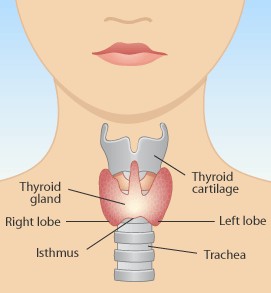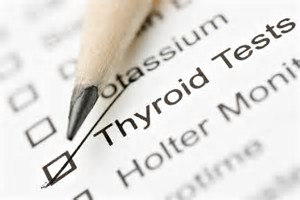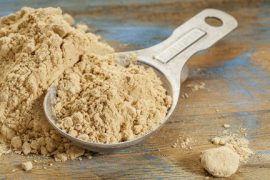The most common problem I hear from people is “I’m just so tired all of time.” Whether it’s their hectic schedule, poor diet, or a health issue, exhaustion and a slow metabolism is a complaint that affects men and men across the country. The most common root cause of the issue is related to the thyroid.
Hypothyroidism, sometimes referred to as an underactive thyroid, is a condition in which the thyroid doesn’t produce enough hormones. An estimated 27 million Americans have thyroid disease, and sadly about 13 million of them are undiagnosed. The risk of thyroid disease increases as we age, in addition women are seven times more likely than men to develop thyroid problems.
Thyroid basics
The thyroid is a butterfly shaped gland normally weighing less than one ounce, it is located at the front base of the neck. The thyroid produces hormones, noteworthy are thyroxine (T4) and triiodothyronine (T3). This gland may be small, but it produces hormones that influences every cell, tissue and organ in the body, including metabolism, growth and development and body temperature. Its proper function is dependent on two trace minerals iodine and manganese. Of the two, iodine is the most essential for proper thyroid function and health.

Four hormones critical to thyroid hormone production
Iodine- Eighty percent of the body’s iodine supply is stored in the thyroid. Iodine is used to make the hormone thyroxine (T4).
Thyrotropin-releasing hormone (TRH)-This thyroid hormone, is produced in the hypothalamus, which monitors and regulates thyrotropin levels.
Thyroid-stimulating hormone (TSH)-Also called thyrotropin, is secreted by the pituitary gland. This hormone directly influences the process of iodine trapping and thyroid hormone production.
Thyroxine (T4) and Triiodothyronine (T3). Thyroxine (T4) is the key hormone produced in the thyroid gland. Low levels of T4 produce hypothyroidism, and high levels produce hyperthyroidism.
Common causes of thyroid imbalance
While there can be numerous causes of thyroid problems here are some of the most common.
Deficiency-Mineral deficiency, especially iodine and selenium, can contribute to thyroid problems.
Toxicity-Radiation or heavy metal exposure. Amalgam fillings can also contribute.
Hormone imbalance-Too little fat, too many carbs and high cortisol levels.
Food allergies-Specifically casein and gluten.
Medications-Some medications can reduce hormone production in the thyroid.
Hashimoto’s –Autoimmune disease, which cause inflammation in the thyroid.

Common symptoms of hypothyroidism
Dry skin
Lower body temperature
Sluggish
Always tired
Feeling cold
Insomnia
Constipation
Depression
Bad memory
Low sex drive
Tingling in hands
Bruising
Nervousness
Tremors
High cholesterol levels
Puffy face and /or eyes
Poor flexibility
Weight gain
Hair loss

Natural Help for Hypothyroidism
- Remove amalgam fillings-Find a biological dentist to help with safe removal of these fillings which contain mercury
- Adaptogens-Add adaptogens like Tulsi or Ashwaganda to help your body “adapt” to stress inducing factors of everyday life.
- Supplements– Not having enough micronutrients and minerals can aggravate symptoms. Check your vitamin and mineral levels for deficiency: vitamin D, omega 3, iron, essential fatty acids, vitamin A and B vitamins, as well as iodine, zinc, copper and selenium.
- Greens-Add dark leafy mineral rich greens to your diet.
- Healthy Fats-Include healthy fats such as avocado, coconut oil, pumpkinseed oil, raw butter, cod liver oil, hemp seeds, flax seeds, chia, grass feed beef and egg yolks to your meals.
- Gut Health-Keep your digestive health and immune system strong with probiotics, coconut kefir and fermented foods such as beet kvass.
- Carbs-Lower your intake of grains and sugars and instead replace them with healthy fats.
- BPA-Eliminate any products that use or contain BPA. Plastic bottles and some food cans are lined with BPA, an endocrine disruptor that negatively affects your thyroid.
- Selenium-Add selenium rich foods to your diet, such as salmon, grass feed beef, sunflower seeds, Brazil nuts and mushrooms.
- Avoid allergens-Avoid common food allergens such as wheat and dairy which can contribute to leaky gut, which can cause inflammation of the thyroid and negatively impact healthy thyroid function.
- Heavy Metal Detox-Consider adding foods to your diet that naturally help your body to detoxify such as cilantro, turmeric, chlorella, milk thistle and wheatgrass.
- Glutathione-This powerful antioxidant helps to regulate the immune system, minimize auto immune flare ups and strengthen the immune system.
- Inflammation-Address any inflammation issues and avoid foods that trigger an inflammatory response.








